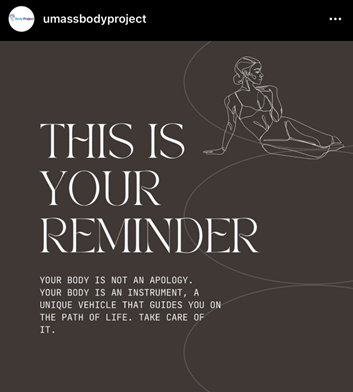The Body Project will hold its first workshop of the semester on Thursday, Oct. 27. The program aims to help students practice body positivity and dismantle social norms around “our bodies, our physical appearance and our expectations as women,” said Martina Higgins, former Body Project facilitator and 2022 University of Massachusetts graduate.
The UMass Body Project aims to reintroduce its participants to their bodies as the “physical vehicle that allows your soul to move through and navigate your life” and begin “recognizing that inner beauty that you have,” Higgins said.
The workshops begin with introductions and then facilitators dive into debunking the “appearance ideal.” Which Higgins explains as society’s “expectation of how women should appear physically,” Higgins said.
“It’s what we as females feel like we have to achieve in order to be accepted, or to be wanted, or to feel that sense of belonging.”
The current “appearance ideal” is a thin white woman with clear skin, a narrow waist, wide hips, and a large behind and bust, noted Charlotte Gilson, a sophomore sociology major, who participated in the February 2022 workshop.
During Body Project workshops, the group discusses ways the appearance ideal manifests in daily life and culture. According to Katherine Host, a 2022 UMass graduate, the pressure crept into her consciousness when she was 10 years old. Host was a former cheerleader and remembers feeling like “you had to look the part.”
“Now you’ve planted that seed in their head, that follows you,” Host said. “You don’t just snap out of that.”
“I was told that I needed to lose weight and I would dance better if I had lost weight,” said Miranda Milunsky, a 2022 UMass graduate. “You can really see the lack of acceptance and the fat bias that exists even with bodies that are normative.”
The concepts dismantled over the course of two planned workshops are expanded upon in the honors seminar, Fighting Fatphobia. Taught by Eliza Frechette, a kinesiology professor at UMass, the curriculum was designed in collaboration with Host and Milunsky. The course centers around the “approach that fat bias is largely cultivated in a systemic way that is a learned behavior,” Frechette said.
The pervasive imagery of women across mainstream media “is very much tied to being white and being feminine in the male gaze,” Frechette said. “The white feminine aesthetic has been for years put up as what is beautiful, and although things are changing, I would argue not fast enough.”
The Body Project also discusses how posts on social media amplify body negativity and the appearance ideal. “It feels like there’s this epidemic of insecurity in young women nowadays and a lot of that has to do with being on social media and seeing all these seemingly perfect bodies,” Gilson said.
“One of the reasons why it’s so important to not try to change for the beauty standard is because it’s always changing,” Gilson said. “It’s not right for bodies to be seen as trends.”
Gilson beamed as she described her facilitators highlighting the beauty of all bodies and the appearance ideal merely reflecting trends by discussing the Greek goddess Aphrodite. A symbol of beauty before photoshop, Aphrodite’s body strays from today’s appearance ideal. In statues and paintings, “She had curves, she had a stomach, she had hips,” Gilson said. “She looked real.”
During workshops, the facilitators ask participants to complete three assignments to increase self-love and body acceptance. According to Higgins, the most difficult exercise challenges the women to stand in front of the mirror with as little clothing as they feel comfortable with and list 15 pieces of their personalities and bodies which they love.
“It was really difficult for me to just admit that I liked something about my physical body,” said Gilson, who has taken the workshop in the past. “Wow, I’ve come this far, and my thighs are beautiful and it’s crazy to be able to admit that,” she said, explaining her own experience with the challenge.
As part of the course, participants write a letter, either to their younger selves or a young girl, with advice to “help them struggle a bit less with societal pressures,” Higgins said.
“My letter was almost pleading to my past self to not conform or fall into the trap of society and changing your body,” said Gilson. Referring to her deprecating self-talk that started at a young age, she said, “Imagining myself saying that to my past 8-year-old self or any 8-year-old girl was heartbreaking.”
According to Higgins, “an incredible feeling of connectedness” develops throughout the group when they reflect on the exercises in the second session. The workshops are always peer-led, “it felt more like talking to friends,” Gilson said.
Nine months after she took the workshop, Gilson still says five things she loves about herself when she sees her body in the mirror. “It really helped me think about how beautiful my body is and how strong and capable my body is, and how it’s so much more than an object for social media or an object for society,” she said.
Students can sign up for the next free workshop on Oct. 27 and Nov. 3 from 5:30 to 7:30 p.m. through the link in the Body Project Instagram bio.
Aalianna Marietta can be reached at [email protected].


















